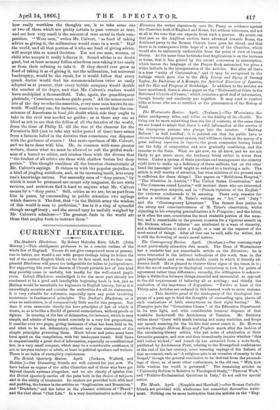The Westminster Review. April. (Trubner.) — The Westminster dis- dains catchpenny titles,
and relies on the fidelity of its clientele. No- thing can be more uninviting than the list of contents, at the same time we are bound to admit that there is solid information at the service of the courageous persons who plunge into the interior. "Railway Reform" is well handled ; it is pointed out that the public have to choose between the present system, that will leave them at the mercy of a great railway imperium in imperio, the great companies having found out the folly of competition and now gradually combining, and the transfer to the State. What we get now, we all know, and we are not likely to get much more, the tendency being rather to worse than better. Under a system of State purchase and management the country might have to make up a deficiency of three millions, but on the other hand the passenger tariff might be reduced to a farthing a mile. The article is well worthy of attention, but what minister of the present race is sufficient for these things ? The papers on "Bethlehem Hospital," "The Situation ,in Austria," "The United States Constitution," and "The Commons round London," will instruct those who are interested in the respective subjects, and in "French Opinions of the English" the reviewer condescends to be amusing. There only remains for notice a criticism of M. Taine's writings on "Art," and " Italy " and the "Contemporary Literature." The former does justice to the nicety and conscientiousness of M. Taine's observation, whilst objecting to his sweeping generalizations a la Fravaise ; and the latter, as is often the case, constitutes the most readable portion of the num- ber, and is remarkable on the present occasion for a vigorous assault on Mr. Dickens, whose " failures " are attributed to a want of sincerity, and a determination to raise a laugh or a tear at the expense of the most sacred of things. After all that can be said, adds the writer, Art is still the flowering of man's moral nature.






























 Previous page
Previous page